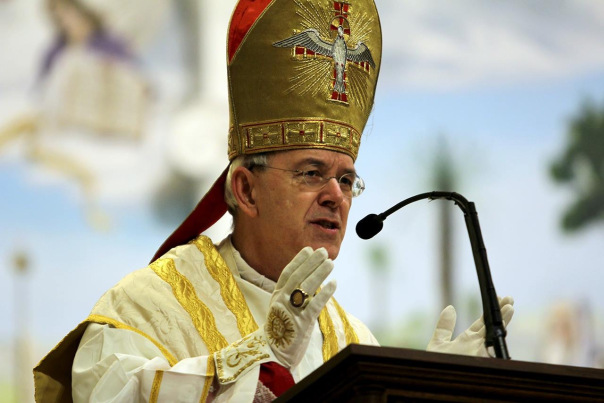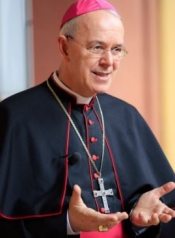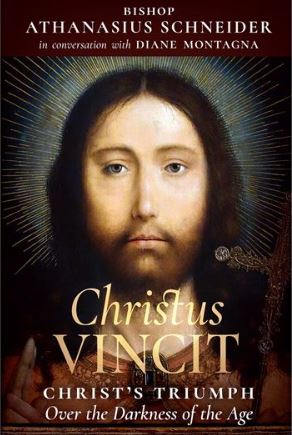Ever since the publication of his little book Dominus Est!, Bishop Schneider has used the weight of his arguments and of his episcopal office to promote the worthy and reverent reception of Holy Communion. For the way we treat our Lord in the Sacrament shows what we believe about Him—or indeed whether we believe at all.
From this centermost point of the Catholic Faith there flows out the necessity of solemn, reverent, beautiful liturgy, an opus Dei that is manifestly from God and for God. Bishop Schneider has repeatedly emphasized the crucial importance of rediscovering and reintegrating into the daily practice of the Faith the great traditional forms of our worship that sustained holy men and women for all the centuries of Christianity.
Read The Remnant's Exclusive Interview with Bishop Schneider on the COVID emergency
In an address he gave in Paris years ago, Bishop Schneider memorably stated that the liturgical reform and its implementation inflicted “five wounds” on the Mystical Body of Christ: first, “the celebration of the sacrifice of the Mass in which the priest celebrates with his face turned towards the faithful, especially during the Eucharistic prayer and the consecration, the highest and most sacred moment of the worship that is God’s due”; second, “communion in the hand”; third, “the new Offertory prayers,” with the abolition of the old Offertory; fourth, “the total disappearance of Latin in the huge majority of Eucharistic celebrations”; fifth, “the exercise of the liturgical services of lector and acolyte by women as well as the exercise of these same services in lay clothing while entering into the sanctuary during Holy Mass directly from the space reserved to the faithful.” In my book Resurgent in the Midst of Crisis, I summarized these five wounds with a mnemonic device: (1) Closed Circle; (2) Proud Posture; (3) Obliterated Offertory; (4) Lapsed Language; (5) Malleable Ministries. These aberrations, together with many others, have stripped the Roman liturgy of its noble beauty and transcendent holiness. The only permanent solution is to undo each and every one of these mistakes, in order to connect again with what is truest, best, and greatest in our heritage.
Beyond questions of fittingness and of internal coherence with Catholic tradition, Bishop Schneider has also courageously engaged with the urgent problem of the collapse of moral theology within the Church. Although Pope John Paul II had endeavored to reverse this collapse, particularly with the encyclical Veritatis Splendor, his successor on the throne of Peter, Pope Francis, has promoted consequentialism and proportionalism by means of the manipulation of the Synods on marriage and the family, the apostolic exhortation Amoris Laetitia, and the publication of the Buenos Aires guidelines, actions utterly unworthy of the Vicar of that same Christ who taught unequivocally in the Gospels that cohabitation with another partner while one’s spouse is still alive is the grave sin of adultery. In company with other bishops and cardinals who recognize their responsibility before God, Bishop Schneider has refused to allow this error and others like it—the false teaching on the death penalty, for example, or the religious indifferentism espoused in the Abu Dhabi statement and its aftermath—to stand unchallenged and uncorrected.
If we do not get these things right—if our worship is lacking in due formality, sacredness, and continuity with tradition; if our approach to the greatest of all God’s gifts, the Holy Eucharist, is casual and presumptuous; if our adherence to immutable Catholic doctrine on faith and morals is sacrificed to the idols of pastoral expediency and pseudo-mercy—then we are rebels against Jesus Christ, offenders of His love, enemies of His reign, obstacles to His work, denigrators of His good news. In short, all these things have been a veritable anti-evangelization that, so far from converting the world to Christ, as the Second Vatican Council claimed was its intention, has rather alienated Catholics from Christ and conformed them to a secular world in freefall from natural and divine law.
Bishop Schneider's latest book, Christus Vincit, is available on Amazon
In this perilous situation, as in the fourth-century Arian crisis that swept over the Church and deceived all too many bishops in the hierarchy, we need our own Athanasius more than ever. Though He allow a time of great tribulation and purification, the Lord will not abandon His Church to her enemies, to the devouring dragon. As we read of the lineage of King David: “The surviving remnant of the house of Judah shall again take root downward, and bear fruit upward; for out of Jerusalem shall go forth a remnant, and out of Mount Zion a band of survivors. The zeal of the Lord of hosts will do this” (2 Kgs 19:30–31).
The remnant that will survive are the Catholics “who take root downward” in tradition and “bear fruit upward” in keeping the commandments; who, starting from the temple in Jerusalem, that is, the Body of Christ in the Holy Eucharist, and from Mount Zion, which is the Sacred Liturgy, then “go forth” to their work in the world, ready to give patient witness to the eternal Law of God, the unchanging Rock which is Christ, and the Beauty ever-ancient, ever-new, that will save the world. “The zeal of the Lord of hosts will do this.” As St. John says in the Apocalypse: “Here is a call for the endurance of the saints, those who keep the commandments of God and the faith of Jesus” (Rev 14:12).






